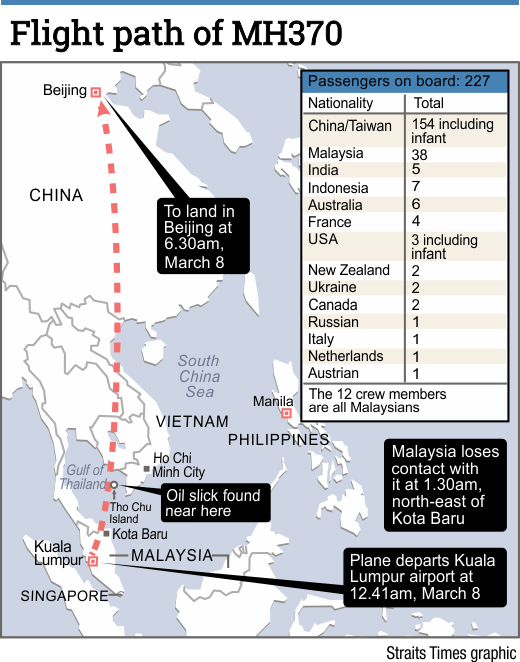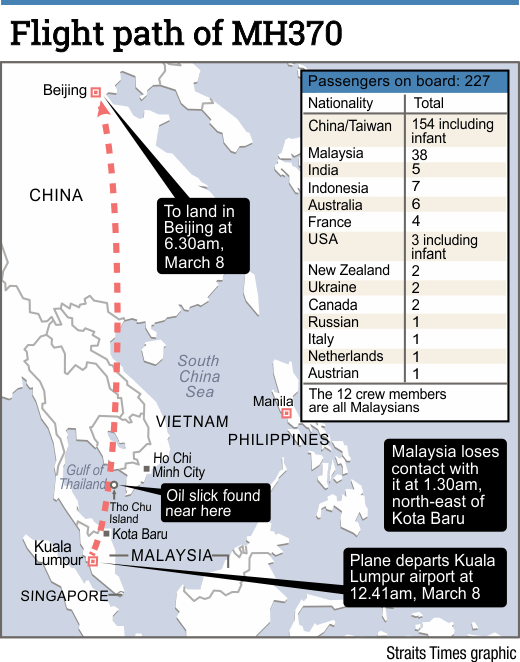On March 8, 2014, Malaysia Airlines Flight 370 vanished into thin air, transforming from a routine international journey into the most perplexing aviation mystery of the 21st century. The Boeing 777 departed from Kuala Lumpur International Airport at 12:41 AM, carrying 239 passengers and crew members, seemingly destined for Beijing. However, just a few hours into the flight, something extraordinary and unprecedented occurred.
Radar data revealed a shocking deviation from the planned route, with the aircraft mysteriously changing direction and disappearing from civilian tracking systems. Pilots’ final communication seemed routine, with the co-pilot’s last words, ‘Good night, Malaysian three-seven-zero,’ hanging in the air like an eerie premonition of the inexplicable events about to unfold.

Flight path of MH370 showing its last known positions – Image credit: DataVizBlog
The search for MH370 became the most expensive and technologically complex maritime investigation in modern history. Advanced sonar technologies were deployed across vast stretches of the Indian Ocean, with teams using sophisticated underwater mapping equipment to scan hundreds of thousands of square kilometers of seabed. Mathematical probability models and ocean current simulations became critical tools in narrowing down potential crash sites.
Satellite technology played a pivotal role in the investigation. The Inmarsat satellite system provided crucial ‘handshake’ data, revealing the aircraft’s potential final trajectory. These digital breadcrumbs suggested the plane had flown south into the remote southern Indian Ocean, far from any landmass, creating a search area that challenged even the most advanced marine exploration capabilities.
Comprehensive overview of MH370’s disappearance – Image credit: GraphicNews
Investigators meticulously compiled radar data, communication system logs, and aircraft performance calculations to reconstruct the flight’s potential path. The Inmarsat satellite data analysis became a breakthrough moment, allowing researchers to triangulate the aircraft’s approximate location based on signal transmission times and angles.
Each piece of digital evidence was scrutinized, with experts developing complex algorithms to interpret the fragmented information. The investigation revealed that MH370 had likely traveled for several hours after losing contact, following an unexpected southern route that defied initial assumptions about its destination or intent.

Detailed analysis of MH370’s flight path – Image credit: Wikimedia Commons
Despite the extensive search, only fragments of the aircraft were discovered. The most significant finding was a flaperon—a movable part of the wing—discovered on Réunion Island in 2015. Scientific verification processes confirmed this piece originated from MH370, providing the first tangible proof of the aircraft’s fate.
Subsequent debris finds along the African coastline and various Indian Ocean islands offered additional, though limited, insights. Drift pattern analyses helped researchers understand how ocean currents might have dispersed aircraft fragments, creating a complex puzzle of potential crash locations.
Beyond the technical investigation, MH370’s disappearance profoundly impacted hundreds of families who were left without closure. International search efforts became a testament to global cooperation, with multiple countries investing significant resources in the quest for answers.
The financial implications were staggering. The search operation cost approximately $160 million, making it the most expensive aircraft investigation in history. Governments, airlines, and international aviation bodies collaborated, demonstrating unprecedented commitment to solving this maritime mystery.
The MH370 disappearance remains one of aviation’s most haunting unsolved mysteries, a reminder of how vast and unpredictable our world can be. Despite advanced technologies and extensive investigations, some questions may forever remain unanswered.
References:
DataVizBlog – MH370 Infographics – link
GraphicNews – What We Know About Flight MH370 – link
Wikimedia Commons – MH370 Flight Path – link
Categories: Aviation, Disasters, International News, Mysteries, Unsolved Mysteries
Tags: aircraft disappearance, aviation disaster, aviation mystery, Indian Ocean, Malaysia Airlines, maritime search, MH370
Religion: Not applicable
Country of Origin: Australia, China, India, Malaysia
Topic: Aviation Mystery
Ethnicity: Multiple



